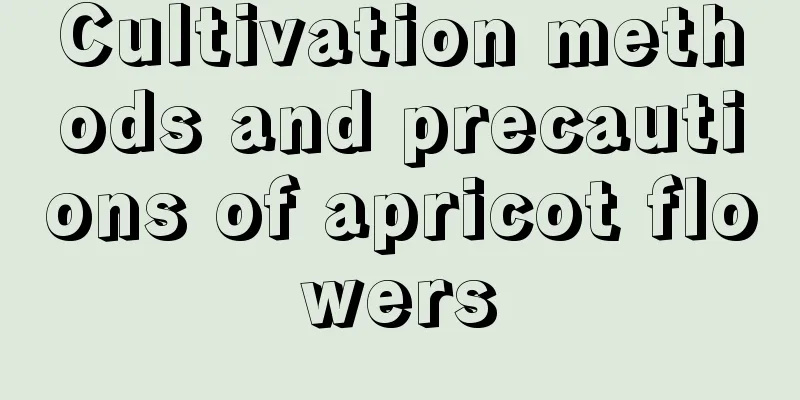Cultivation methods and precautions of apricot flowers

1. Maintenance methods1. Soil: The soil for growing apricot flowers must have sufficient nutrients, and fertile and acidic soil is the best. The soil comes from river sand, vegetable gardens, rotten leaves, and sandy soil. 2. Water: The water demand of apricot flowers is different in each season. For example, in spring and autumn, it is enough to water them every two to three days. In summer, the temperature is too high and the apricot flowers have a high demand for water, so they can be watered twice a day. In winter, you don’t need to water as much, once a week is enough. 3. Nutrients: When the apricot flowers are in the vigorous development period, they should be fertilized once every seven days, and organic compound fertilizer should also be applied appropriately. But avoid excessive fertilization, which will cause the flowering period of the apricot flowers to be short and the petals to wither quickly. When autumn comes, you should reduce the amount and frequency of fertilization, and it is sufficient to apply fertilizer once every 20 to 30 days. 4. Sunlight: It has a great demand for sunlight and likes warm and bright environment. It should be able to enjoy sufficient sunlight every day. 2. Breeding techniques1. Pruning: During the maintenance period, branches that are not growing well should be pruned from time to time. In order to better protect the apricot flowers, rotten leaves and branches should also be cleaned up. 2. Reproduction: Generally, the grafting method is used. The time for grafting is the second half of July. The bud grafting and bundling method can be used. After the grafting is completed, just wait for the germination in spring. 3. Problem diagnosis and treatment1. Diseases: If the maintenance environment is not appropriate, apricot flowers are easily infected with black spots and yellowing diseases. These should be treated in time by adjusting the environmental conditions of the apricot flowers and using drugs. 2. Pests: For insects such as caterpillars, red spiders, and aphids, diluted DDT and polychlorvos can kill the insects. IV. Other issues1. How to spend the winter: Water the apricot blossoms once in winter, then trim the dead and old branches, and then clean up the rotten leaves and branches. 2. Can it be raised at home: Yes, it can be raised at home. Apricot trees can not only bloom and bear fruit, but can also be used as ornamental trees. They can be cultivated in the courtyard and wait for the flowering season, which is also a landscape. |
<<: Cultivation methods and precautions of star wood
>>: Chamomile cultivation methods and precautions
Recommend
How to maintain Marcus succulent
Marcus Succulent Growing Conditions Marcus succul...
Is garlic a shade or sun-loving plant?
Does garlic prefer shade or sun? Garlic is a sun-...
Common varieties of grapefruit
Pomelo The ripening time of Shatian pomelo is gen...
When is pineapple ripe?
January, April Its ripening time is divided into ...
The medicinal value and dietary taboos of wolfberry
Medicinal value of wolfberry 1. Lycium barbarum h...
How often should orchids be watered? How much water should be watered?
Most people who grow orchids do not know how to w...
Key points for the cultivation of cyclamen
Cyclamen seed treatment Cyclamen is usually propa...
How to grow jasmine so that it blooms more vigorously?
With the arrival of June and the gradual rise in ...
What are the breeding methods and precautions for flying feathers?
Flight feather breeding method Feiyu prefers a se...
The cultivation method and precautions of Bahiag
1. Planting and management Bahiagia can grow in a...
Key points of high-yield planting and management technology of loofah
Luffa plants have a high demand for fertilizer , ...
When to prune gardenias
1. Pruning time Generally speaking, gardenias nee...
How to care for dancing orchid
1. Maintenance methods 1. Light: Dancing orchid i...
Does mango prefer shade or sun?
Does mango prefer shade or sun? Mango is a fruit ...
Can orchids be grown indoors?
Can orchids be grown indoors? Orchids are suitabl...









